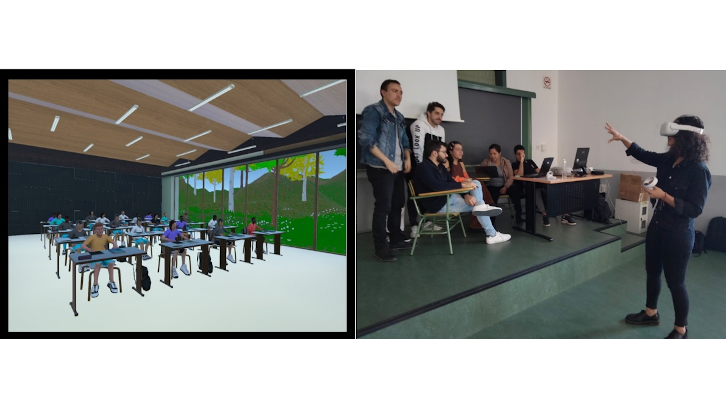Educational transformation: Immersive Virtual Reality in teacher training

Immersive Virtual Reality (IVR) is revolutionizing teacher training by offering practical simulations of disruptive classroom situations. A study led by the Universitat Autònoma de Barcelona and the Universidad Complutense de Madrid highlights that the IVR - Didascalia Virtual-Classroom platform improves competencies in educational management and promotes its integration and acceptance among future and current teachers.
The training of trainers is perceived by students as insufficient and too theoretical. In response, Immersive Virtual Reality (IVR) systems have been implemented. This technology uses virtual environments to immerse the user in a simulated experience, allowing them to feel physically present in the chosen environment. IVR enhances the practical part of the theory shown in classrooms, always in a controlled manner and without real negative consequences.
In the study conducted by the Complutense University of Madrid and the Autonomous University of Barcelona, the usability and acceptance of this tool in the training of trainers were analyzed, specifically with the IVR - Didascalia Virtual-Classroom system. With this platform, tested with 84 participants, usability issues were comprehensively analyzed to improve functionality and facilitate its integration into teacher training. Additionally, 278 people related to teaching or trainer training were surveyed to obtain a more extensive and complex analysis.
To understand the study's results, it is necessary to explain how the platform works. It allows complete immersion for students through virtual reality headsets. During the simulation, the person faces three common disruptive behaviors in a classroom and must react. According to their response, tone of voice, content of speech, non-verbal language, distance from the avatars, and gaze direction, they will receive a response from the program. Subsequently, in the classroom group, the decisions made are evaluated and reflected upon to discover improvement strategies, build knowledge, and develop competencies. This allows the evaluation of the teacher's performance based on their ability to perceive and interpret events relevant to learning more realistically. For more information, in this link there is a video about a complete activity.
The study results on Didascalia VC indicate that the platform was well-received by both practicing and future teachers. High acceptance was observed in terms of usability, perceived usefulness, attitude, and intention to use it to develop classroom management skills. Participants expressed their desire to use the platform in the future, suggesting its implementation in workshops, school projects, and progressive and personalized training modules. However, areas for improvement were identified, such as the need for more detailed feedback and better initial preparation. The results suggest that Didascalia VC has the potential to be a valuable tool for developing classroom management skills in teacher training, as well as other Immersive Virtual Reality tools that bring classroom reality closer.
Ibis M. Álvarez1, Borja Manero2, Alejandro Romero-Hernández2, Miriela Cárdenas3 & Isabel Massó3
1Department of Basic, Evolutionary and Educational Psychology, Universitat Autònoma de Barcelona
2Department of Software Engineering and Artificial Intelligence, Universdad Complutense de Madrid
3PhD student. Interuniversity Doctorate in Educational Psychology (DIPE-UAB)
References
Álvarez, I. M., Manero, B., Romero-Hernández, A., Cárdenas, M., & Masó, I. (2024). Virtual reality platform for teacher training on classroom climate management: evaluating user acceptance. Virtual Reality, 28(2), 1-17. https://doi.org/10.1007/s10055-024-00973-6


